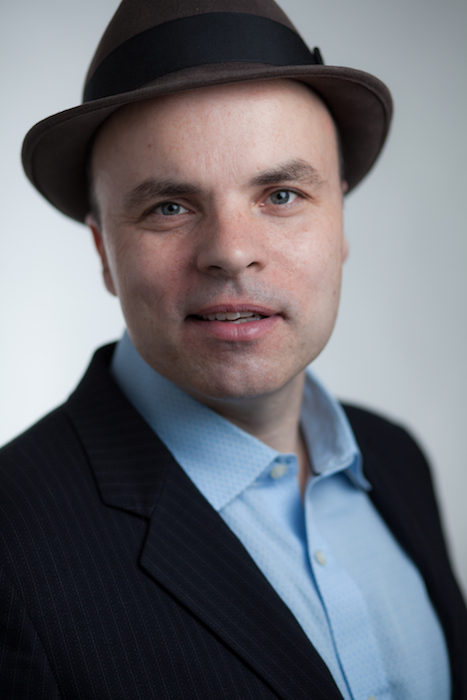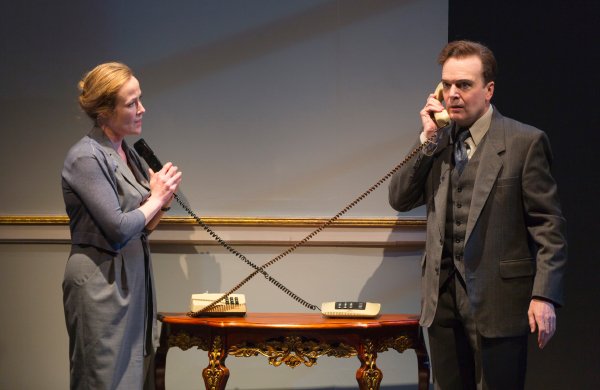Pioneer Theatre to open season with “Oslo,” a timely plea for diplomacy

J.T. Rogers’ “Oslo” will open the Pioneer Theater Company’s season on September 14. Photo: Rebecca Ashley
The Oslo peace process culminated with an iconic photograph taken on the White House lawn on September 13, 1993. The picture captured the historic handshake between Israeli prime minister Yitzhak Rabin and Yasser Arafat, chairman of the Palestine Liberation Organization (PLO) as President Bill Clinton stood behind them, his arms outstretched in a wide embrace.
The banner headline that appeared above the photo on the front page of the New York Times the next day declared: “Rabin and Arafat Seal Their Accord as Clinton Applauds ‘Brave Gamble’.” Times journalist Thomas Friedman described the moment as “a triumph of hope over history.” Yet Arafat died on November 11, 2004, and Rabin was assassinated on November 4, 1995, by which time the accord had long since unraveled.
As it happens, none of the three figures pictured in the photo are seen onstage in J.T. Rogers’ Tony Award-winning play, Oslo, which will receive its Salt Lake City premiere September 14 at the Pioneer Theatre Company in a production directed by Karen Azenberg.
That is because for Rogers, the most dramatically intriguing aspect of the Accord was the secret “back channel” negotiations that were set in motion by Mona Juul and her husband, Terje Rod-Larsen, a pair of married Norwegian envoys. Somehow this pair managed, against all odds, to bring representatives of the two sides together at a castle in Norway where they eventually agreed to make a number of fundamental concessions—at least for the moment.
“I always come to any discussion of Oslo with a big caveat,” said Rogers, 50, who was born in Berkeley, California, raised in central Missouri, and now lives in Brooklyn with his wife, a photographer, and teenage son. “As I told the rather daunting audience of 1,200 United Nations people who came to see the show in New York, I’m a playwright, not a diplomat or historian. I mostly ruminate, and fictionalize things to a certain extent, and try to engage audiences in stories framed against great political ruptures.”
Those stories have ranged from his 2006 play, The Overwhelming, set on the eve of the 1994 Rwandan genocide, to his 2010 drama, Blood and Gifts, about American, Soviet, British and Pakistani involvement in Afghanistan in the 1980s.
The child of “1960s lefties,” Rogers’ father was a professor of political science who specialized in Southeast Asia, and his mother was “a bohemian” who moved to New York’s East Village when they divorced. In the late 1970s, he and his brother spent several years living with their father in rural Malaysia and Indonesia, an experience that, as an adult, he realized “was a great gift.”
“We were truly ‘the others’ there—-attending local schools and struggling with the Malay language, and living without running water. Later we spent summer vacations in New York where my mother introduced us to theater at places like La Mama and the Public Theater. And I set out to be an actor [he graduated from the University of North Carolina School of the Arts] before I turned to writing.”
The seed for Oslo was planted in 2012 as Blood and Gifts was playing at the Lincoln Center Theater and its director, Bartlett Sher, arranged for him to meet Rod-Larsen, who was then serving as a United Nations special envoy in New York. A trip to Norway and extensive research soon began.

Jennifer Ehle and Jefferson Mays starred in “Oslo” in its 2016 Lincoln Center Theater premiere. Photo: T. Charles Erickson
Oslo debuted to rave reviews when it opened at New York’s Lincoln Center Theater in 2016, and received the same response the following year at London’s Royal National Theatre.
Asked what he thinks is essential about the art of diplomacy, especially in an era, when Tweets seem to have replaced back-channel negotiations, Rogers said, “I think that now, even more than in 1993, it has to be understood that there is a double chess game going on all the time. There is what we see, and there is what is going on under the table. And I just hope that with the current administration there is conversation going on away from the camera even if politicians are always talking to two cameras.”
“The crux of the matter is for both sides to come up with a compromise that neither likes but that both can agree on without making the other seem evil. And to do that means they have to see each other as flesh-and-blood human beings. For that we need more people talking to each other in private rooms where small, personal things can often ripple out and surprisingly change things. And while all this can often be very troubling to the parties involved, it is thrilling for a dramatist.”
Plans are already well underway for Rogers and Sher to team up again on the film version of Oslo even as productions of the play are being planned at theaters in Europe, Israel and the U.S.
So how did Utah’s Pioneer Theatre manage to snag the rights to the play before it has been seen in bigger cities?
“Back in 2000, the Salt Lake Acting Company produced my play White People, and subsequently helped develop and produce Seeing the Elephant and commissioned and produced the world premiere of Madagascar,” said Rogers. “So I’ve spent quite a lot of time in the city and have a great fondness for it.” (He will be returning to Salt Lake to see Oslo on its opening weekend.).
Director Karen Azenberg said that Oslo is timely for our politically polarized era because it stresses the need for people with drastically different backgrounds and political philosophies to communicate with each other.
“The important thing to remember when working on this play is that it is not a documentary but rather, a look at what it takes to get people who wouldn’t ordinarily talk to each other to do so,” said Azenberg. “And often, when you break bread with people, and talk about your family, and about the food and books you like, you begin to find commonalities, even if you are on very different pages.”
“I’m Jewish and have been to Israel often,” she added. “And of course I have opinions about what should happen, as many people do on this topic.
“But the one thing I hope both the cast and community will talk about after seeing the play is whether it helped them put their pre-conceived notions to the side, if only for a moment.”
The Pioneer Theatre Company production of Oslo runs September 14-29 at the Roy W. and Elizabeth E. Simmons Pioneer Memorial Theatre at the University of Utah, 300 South and 400 East, Salt Lake City. 801-335-4565; pioneertheatre.org/tickets/.
Hedy Weiss served as the Theater and Dance Critic of the Chicago Sun-Times from 1984-2018. She has been a longtime commentator on theater for “Chicago Tonight,” the nightly news magazine for WTTW, Chicago’s PBS affiliate, and contributes reviews on all the arts to its website. She also writes a monthly cultural column for The Jewish United Fund’s magazine and has contributed to Dance Magazine, Playbill and other publications.